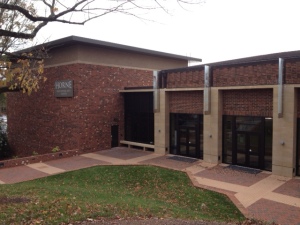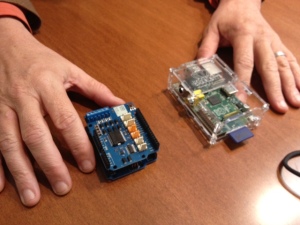I had less than three hours to visit Charlotte Latin School, not enough time to tour the beautiful campus and take great photos, poke into classrooms, or talk to students. That’s OK; sometimes we learn best by just sitting and listening, and the stream of educators that was fired at me in the Head’s conference room brought a wealth of noteworthy examples of innovation, including the smallest, cheapest, student-programmed computer I have ever seen. I also heard such a perfect articulation of the role of empathy in our learning that I have embedded a short interview video. But I want to start this blog from the end of my visit, when Head Arch McIntosh and I talked about what is not at Charlotte Latin.
 Charlotte Latin is a large and highly respected preK-12. Let’s state at the outset that they enroll students at the high end of the achievement scale, though anyone will tell you that defining high achievement potential in a 3-4 year old is not an exact science. They have what I believe is a unique and courageous mission statement; it does not mention college preparation. It does not mention academic achievement or a rigorous course of study. These are not mentioned in the list of Beliefs or their list of Core Values. Arch: “At admissions events I sort of surprise everyone by spending the first ten minutes talking about we are not about. Then we get to our core values, and that is where we are very intentional, starting at the Lower School. We try to focus our conversations on who we are trying to produce, to honestly live the honor code. I have lunch with every senior every year, and in five years every one of them has talked about what it means to be at a school that takes the honor code so seriously.” I can’t list all of those values here; I encourage others to look at the CL mission statement, beliefs, and core values on their web site, and to reflect on what it might mean to focus on these. CL believes, and it is born out by their results, that if you focus on these values, academic achievement is a result.
Charlotte Latin is a large and highly respected preK-12. Let’s state at the outset that they enroll students at the high end of the achievement scale, though anyone will tell you that defining high achievement potential in a 3-4 year old is not an exact science. They have what I believe is a unique and courageous mission statement; it does not mention college preparation. It does not mention academic achievement or a rigorous course of study. These are not mentioned in the list of Beliefs or their list of Core Values. Arch: “At admissions events I sort of surprise everyone by spending the first ten minutes talking about we are not about. Then we get to our core values, and that is where we are very intentional, starting at the Lower School. We try to focus our conversations on who we are trying to produce, to honestly live the honor code. I have lunch with every senior every year, and in five years every one of them has talked about what it means to be at a school that takes the honor code so seriously.” I can’t list all of those values here; I encourage others to look at the CL mission statement, beliefs, and core values on their web site, and to reflect on what it might mean to focus on these. CL believes, and it is born out by their results, that if you focus on these values, academic achievement is a result.
Arch says that they have seen real change in the last 10 years, though there is still that healthy tension between tradition and innovation. A decade ago, teachers did their own thing and students were relatively voiceless. That is rapidly reversing, due in part to sea changes of faculty demographics, and younger teachers who are naturally more comfortable with change. I reprised for him my sense, based on visits at so many schools, that we need to do a better job of managing the amplitude and frequency of focal events surrounding both change and not-change. Arch said that he sees a lot more “connections” but he is worried about “relationships”, the deeper way that people interact, even when they are connected by interest.
I had just 30 minutes with the division heads and won’t try to attribute quotes directly. They said that innovation is a “willingness to respond to a world as best we can to discern how we need to prepare our students”. “We have to change our method of engagement with students and teachers side-by-side in the business of learning together.” One advantage that Latin has is a long-standing culture of creative pedagogy within a traditional array of subject areas. They have always encouraged faculty, with the support of robust PD, to continue to learn more over time, to not stagnate in their course work. The Lower School has created a “portrait” of a Lower School graduate that aligns with the mission and is helping to drive changes in the curriculum. They are focusing on teaching students the skills to be “good evaluators of their own education” as so much of what they learn comes not from the teacher but from other sources.
Finding new ideas and staying abreast of evolving pedagogies is an expectation on the faculty; “it is on their shoulders”. “Our teachers are masters of their craft, not in an industrial age sense. We are not trying to herd them closely; we don’t have to. We expect teachers to cross-pollinate, try new ideas, fail if need-be, and make corrections. We want them to be thought leaders.” Some specific bullets they mentioned about how learning looks now relative to 5-10 years ago:
- Students are introduced at a young age to how they each learn.
- Students own more of their learning; teachers are moving off to the side.
- While there is still a lot of directed instruction, there is more hands-on and interactive work where the students are learning from each other.
- Faculty think more about the outcomes in advance and adjust program accordingly.
I met with Ayeola Elias, Director of Diversity and Multicultural Affairs, who was a part time teacher just a year ago and now is an articulate leader helping other teachers to embed a wider range of viewpoints into their curriculum. She repeated a word that I have heard so many times in this journey that lies at the core of a transformed learning experience: empathy. This is only the second time on this journey that I have uploaded essentially raw video to the blog because it would just be a waste for me to try to quote or paraphrase someone who says it so well!
Some not able to access video; will fix this later today. Sorry!
[youtube http://www.youtube.com/watch?v=NONd9R7vrR0&w=560&h=315]
She is working on an all-school initiative to bring the concept of empathy into focus for both teachers and parents as a core interpersonal skill. They are developing lessons within the advisory program that include media literacy, and a series of lessons and events for both students and parents that deal with media filtering. Empathy is now a core theme of all sophomore English classes; the 6th grade goal is “acceptance of the viewpoints of others”; and the 7th grade theme is “understanding heroes”.
I wish I could accurately report on my half hour with Tom Dubick who teaches engineering, but he had too much to tell me and I am not smart enough to have understood most of it anyway. Tom is one of those forces of creative nature that we wish we could clone, and could if we just focused on doing it. He started working with students in the early 1990’s to build robots out of LEGO’s; developed a 7th-8th and 11th-12th grade STEM/programming course, and now is on the way to make it an integrated 7th-12th course of study. “All STEM is really engineering. Science does not really rely on matters of time and resource; it is about thinking and learning what could possibly happen. Engineering and entrepreneurialism add in the factors of time and other resources. These are highly related to jobs of today and the future, and we need to move the needle to where students have these skills.” Tom says that families have come to Latin just because they offer this course of study, and they are bridging to work with local public schools in summer programs and competitions (adding to the value proposition).
 He pushed a little toy across the table to me and this is where I will get it wrong, but that is OK. (See photo of little plastic box.) This little plastic box is a working computer that costs $35 and can be programmed with SCRATCH, a free program language used by Harvard but simple enough that 5-year olds can learn it. The little computer can run the other toy he had, a $25 robot. A full classroom set costs about $1,400. The students can do all the programming and build the computers. They can write basic games and use it as a controller for other devices. They can plug it into a fancy monitor and it works just like a “real” computer. They can see how simple it is; they see that they can do something like this as well. I could have spent a week with Tom, a person who does not know the meaning of the word boundary.
He pushed a little toy across the table to me and this is where I will get it wrong, but that is OK. (See photo of little plastic box.) This little plastic box is a working computer that costs $35 and can be programmed with SCRATCH, a free program language used by Harvard but simple enough that 5-year olds can learn it. The little computer can run the other toy he had, a $25 robot. A full classroom set costs about $1,400. The students can do all the programming and build the computers. They can write basic games and use it as a controller for other devices. They can plug it into a fancy monitor and it works just like a “real” computer. They can see how simple it is; they see that they can do something like this as well. I could have spent a week with Tom, a person who does not know the meaning of the word boundary.
Charlotte Latin is a self-described place of tradition, but part of that tradition is an embedded growth mindset. Part of that mindset is knowing that they are a far way from 100% when it comes to faculty buy-in about changing the core of the learning experience. What is critical, I believe, is the faith and knowledge as educators that if we focus our energies and talent on creating a learning environment around inspiration, encouragement, empowerment, growth-promotion, and opportunity, high academic achievement is a natural result. We have to get the cart and the horse right. Latin is translating those lofty ideals into nuts-and-bolts stuff for the classroom, all within the context of the pursuit of honor and the building of character.


Leave A Comment